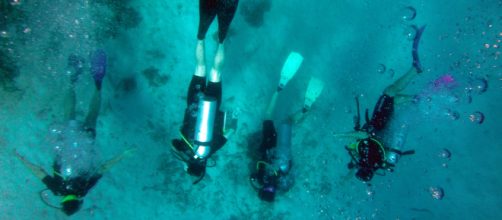Diving is an opportunity to spend time exploring the underwater world that covers most of the Earth's surface first hand. Whether your thing is photography, treasure hunting or getting closer to nature, diving is a cool way to do it, no pun intended.
Diving Is an Experience You Don't Want to Miss
With a little training and some basic equipment, you'll be ready to dive into a spectacularly different world with a plethora of colorful creatures going about their business in unique aqua-habitats. The fraction of senior citizens who dive get to experience a paradise that most people only imagine or observe in flat photos and video images.
Experiencing the real down under is not the same as looking on from a puffy recliner while munching popcorn, trust me on that. The sea is a paradise to be personally experienced, not viewed from afar.
Where Are All the Scuba Diving Buddies?
There are between 2.7 to 3.5 million active scuba divers among our population of 325.7 million (according to the Diving Equipment and Marketing Association).
California, Florida, Virginia/Maryland/DC, Texas, and New York (in that order) are the top diving states in the U.S. I found it a bit mystifying that Hawaii lags behind those states given its natural allure and location in tropical Oceania and 750 miles of island coast, until I discovered the island-state has a measly population of 1,428 million people (2017 Census).
I imagine Hawaii would be among the top five dive states based on a per-capita comparison, its mega-sized sharks notwithstanding.
You’d think there would be more than a few million certified scuba divers in the country since water, some of it deeper than the tallest mountains, covers about 71 percent of Earth. But no, finding a qualified dive-buddy can be as hard as scaring up a karaoke partner to sing Bad Boys, Bad Boys at a Crips and Bloods reunion. Aging divers often hire dive-boats for excursions—or go alone, which can be dangerous.
If you are old enough to sign up for Medicare, or even over fifty, know that you will likely have a difficult time getting old friends to go scuba diving with you.
Many have tinnitus, which some say is worsened by scuba diving. Others have a limited range of motion from old injuries or medical conditions that confine them to the surface. Most will be content listening to the waves crash on the beach while sipping margaritas or watching the glisten of sunlight dance across the water from the comfort of a boat. Others asked to train themselves for a new and bewildering environment, simply don’t trust their instincts; it’s a different world down there, not a natural human habitat.
Getting Certified
Getting a certification from NAUI or PADI as an open-water diver, should you decide to do that, is not complicated. There are a few hours of classroom study and some certification dives and you’re in, but hopefully, not in over your head, pun intended.+
Do remember to pay attention during the dive-tables lecture, because you might otherwise get the bends or drown on your first "certified" dive.
Also, be prepared to swim some laps across a swimming pool as classmates churn and slap alongside utilizing every swim-style from the sleek backstroke to utterly humorous forms of dog-paddling. And seniors beware: swimming twenty laps during August in a warm pool presents different challenges for a sixty-four-year-old than for a twenty-four-year-old.
If student diver breaches, stay out of the way
Oh, one more thing about the first certification dive. It's performance-oriented and directed, observed and scored by the dive master. After the class is underwater for ten minutes or so, one or two students may panic and launch upwards, breaching the surface like goggled seals wearing silver torpedoes.
These folks are usually spouses, partners or well-meaning friends who just aren’t cut out to dive, ever.
The important thing is not to get in their way or try to restrain them—they are going to get to the surface, even if they have to break both your arms. Getting in the way of a breaching student as he or she shoots to the surface like a Polaris Missile can result in one or more concussion injuries to you and, or, the breaching student. Compressed tanks are made of thick steel or aluminum and when powered by a certain level of adrenalin can be quite dangerous. While restraining an experienced but panicked diver at a depth of a hundred feet could save him or her from getting the bends, restraining a panicked dive-student in twelve feet of water can easily result in an unintentional and unnecessary drowning.
If you get through the training, even if your prospective diving partner can't, you should find a way to do some diving, preferably with company. For young and not-so-young adventurists seeking new frontiers, scuba diving is a platform for exploring another world without leaving home. Break a leg, and don't forget to turn on your air.


